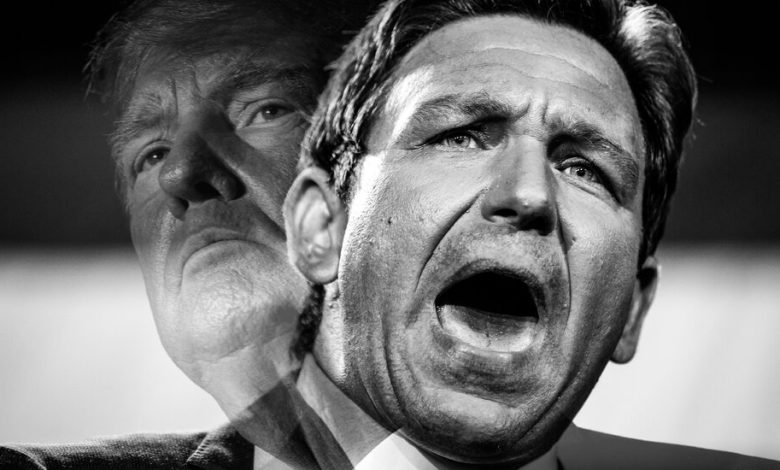What Makes Trump Different From DeSantis and Other Republicans

Despite near-unison attempts from conservative media to declare his moment in the Republican sun over, Donald Trump refuses to go away. He is officially back on the hunt for the Republican nomination, and this resistance from many parts of the Republican universe obscures the fact that he may very well still win the nomination — if not in spite of the elite power brokers of the political right trying to stop him, then perhaps because of them.
In his announcement last week, Mr. Trump said, “Together we will be taking on the most corrupt forces and entrenched interests imaginable.” He pointed out that “this is not a task for a politician or a conventional candidate.” The task falls to an outsider — and Mr. Trump remains, to his supporters, an outsider. They see him as the only candidate truly capable of taking on the system.
Mr. Trump’s appeal has been difficult for many mainstream G.O.P. politicians and pundits to stomach. They’re embarrassed — about Mr. Trump and, in the case of elected officials, about representing people who would vote for him. But the characteristics that Washington Republicans hate — the bombast, the outrageousness — is what makes his base trust him. They love that Mr. Trump points at the system and calls it what it is: corrupt.
The comedian Dave Chappelle recently homed in on this point while hosting “Saturday Night Live.” “I live in Ohio amongst the poor whites,” he said, and went on: “A lot of you don’t understand why Trump was so popular.” People in Ohio “have never seen somebody like him” — an “honest liar,” he said. Mr. Chapelle pointed to Mr. Trump’s comment in a 2016 debate with Hillary Clinton: “He said, ‘I know the system is rigged because I use it.’”
That exchange reflects the essence of the relationship Mr. Trump has with his base. It was striking for someone at the top to say out loud what everyone at the bottom already knew: that the system works for the country’s elite, because that’s what it is designed to do. And that most of American politics since 2016 is about preserving that status quo.
He returned to this theme in his announcement speech: “Anyone who truly seeks to take on this rigged and corrupt system will be faced with a storm of fire that only a few could understand,” he said.
Mr. Trump was a beneficiary of that system, which gave him tremendous credibility in calling it out. He is one of the only politicians who many voters — which in 2016 included a majority of independents — feel has been honest with them.
The professional class sees Washington fixtures like Mitch McConnell as unexciting but necessary institutionalists — people who know how to work the system to “get things done.”
But that’s not how many voters and anti-establishment conservatives see the self-appointed Republican wise men. What did Bob Dole, John Boehner, Mr. McConnell, the Bushes or the Cheneys ever do to stop illegal immigration? Or to protect vulnerable families and communities from globalization? Or to solve the opioid crisis, check corporate consolidation over information and speech, stem the tide of left-wing cultural aggression or stand up for the rights of parents not to have their children indoctrinated in schools?
An entire generation of Republican leaders has blithely ignored and betrayed the core concerns of many Republican voters, while too many of their jobs were shipped to China, their sons were sent off to unwinnable wars and their communities were poisoned by drugs.
Compare this thinly veiled contempt with the way Mr. Trump embraced working-class voters. He was the only Republicans since Ronald Reagan who seemed to genuinely like everyday Americans. The irony of it taking a real estate mogul, reality television star to be the politician most able to connect with grass-roots voters cannot be overstated. As president, Mr. Trump helped deliver rising wages, peace and economic growth, and the Supreme Court justices who overturned Roe v. Wade.
To political insiders, Mr. Trump’s imperviousness to criticism from the likes of National Review or even Tea Party-era conservative standard-bearers seemed like a kind of superpower. To his supporters, though, all those attacks revealed the elitist contempt for conservative voters that those voters had suspected was there all along.
This presents a tricky problem for Gov. Ron DeSantis of Florida or any other potential Republican presidential candidate who seeks to be Trump-y without being Mr. Trump. Mr. DeSantis has vaulted to well-deserved stardom for his aggressive stance against corporate cultural meddling, his fearless defense of parents and his levelheaded foresight in handling the pandemic.
But the defining dynamic of the G.O.P. that enabled Mr. Trump to win in 2016 — primary voters’ deep and justified distrust of the Washington elites to handle the issues they care about the most — adheres in 2022. The conservative intelligentsia and establishment Republicans embracing Mr. DeSantis should understand that their public affection for him may ultimately end up harming a candidate they seek to help.
Mr. Trump still wants to upend the system that Republican voters distrust. Since 2016, the establishment has lit more of its credibility on fire. You don’t have to think Mr. Trump should be canonized as a saint to believe the system is still rigged, as corrupt and hostile to nonelite Americans as ever.
If Mr. Trump once again runs against that system, and the people who run that system haughtily, censoriously align with other candidates, who do you think Republican voters will support?
Rachel Bovard is the policy director at the Conservative Partnership Institute and a tech columnist at The Federalist.
The Times is committed to publishing a diversity of letters to the editor. We’d like to hear what you think about this or any of our articles. Here are some tips. And here’s our email: [email protected].
Follow The New York Times Opinion section on Facebook, Twitter (@NYTopinion) and Instagram.
